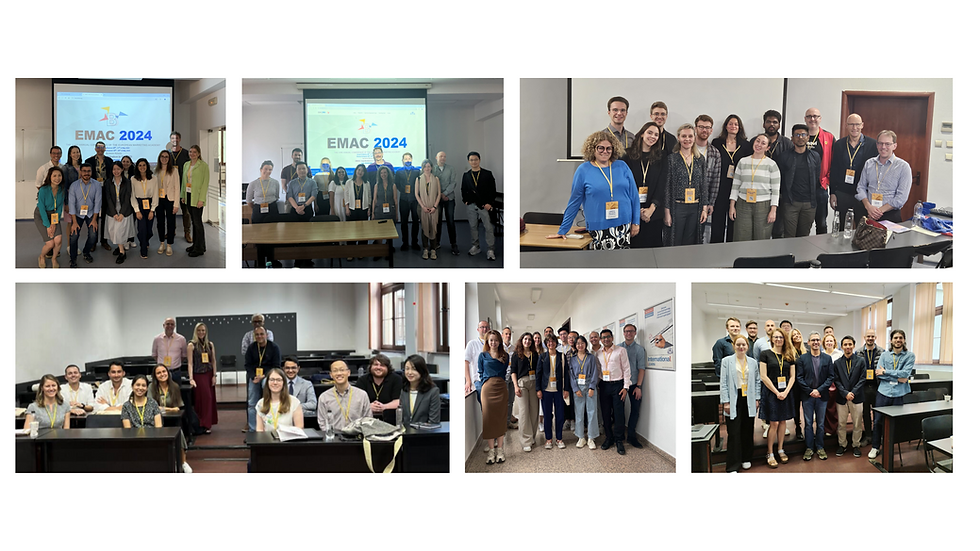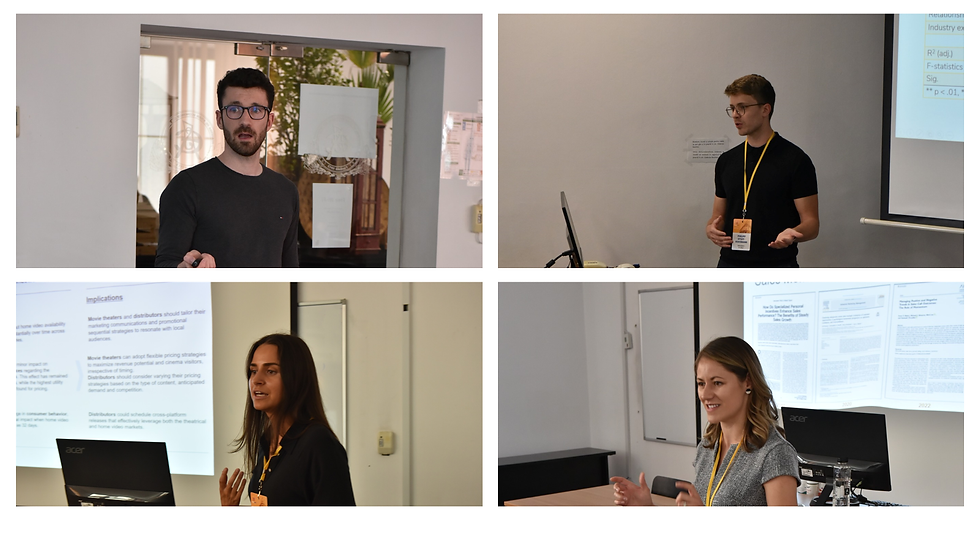You can’t escape the EMAC Doctoral Colloquium
- Marie Brand

- Jun 30, 2024
- 4 min read
Updated: Jul 4, 2024
Written by Marie Brand, Ph.D. Candidate at WU Vienna and Jareef Martuza, Ph.D. Candidate at NHH

Tell anyone that you are a doctoral student attending the EMAC, and they will automatically ask if you are going or have been to the EMAC Doctorial Colloquium (DC). After that, you would hear about their own DC experience and how it impacted their work and life, changing both for the better. Attending the DC ourselves, these conversations reminded us that we were at the right place.
“The Doctoral Colloquium is the best that the EMAC has to offer. Everyone able to attend, both faculty and students can consider themselves lucky.”
– Tammo Bijmolt, Professor of Marketing Research, the University of Groningen
Ever wondered which well-known Professor attended the DC as a student? Who has been the longest-standing faculty track chair? Is the hype around the DC really worth it?
We went to this year’s DC in Bucharest, Romania and we are now spilling the tea and revealing the well-kept secret to the EMAC DC’s success. If you haven’t been to the DC yourself or it’s been a few years since you went, here’s your chance to learn all about it:
The EMAC DC
If you are (or have been) a PhD Student in a Marketing Department in Europe in this century, the EMAC Doctoral Colloquium has likely been (or will be) part of your rite of passage into marketing scholarship, featuring the who’s who of behavioral, strategic, and quantitative marketing. The EMAC DC is a 3-day pre-conference event where 60 PhDs get divided into beginner and advanced tracks across consumer behavior, marketing strategy, and quantitative modeling. There are 6 tracks in total, and each track has seasoned marketing professors, the highlight of the DC- one chair and two co-chairs per track- in charge of the sessions. 60 PhDs, 18 professors, 6 tracks, 3 days, where they spend the three days of the DC giving feedback, critiquing, and encouraging the students’ presentations.
Before the annual EMAC conference kicks off, doctoral students from all over Europe (some from Asia, the Americas, Africa, and Australia too) gather for three days to present their research projects in front of faculty and peers, get feedback on their work, and most importantly: network. It is a Sunday to Tuesday affair, with the DC dinner with all participants and faculty held on the second day of the DC.
In short, the DC is (in)famous in the Marketing community. But what makes it so special?
At least three reasons.
1. The pool of PhD students who participate is diverse
We knew that the DC is well-known and participating in it is special, but we did not realize how much. Every participant we talked to mentioned how professors and fellow PhD students at their institutions urged them to attend and make the most of the DC experience. And for good reason- everyone we talked to was enjoying their time and had helpful takeaways. So, if you or your student gets DC a spot, here’s what’s in store:
“Thrilled, really happy I came! Discussing with the track chairs and fellow participants, felt my research and all the hours dedicated were special.”
-Stephanie Vigier-Zouhar, University of Groningen, Marketing Models, Beginner Track)
“The feedback was precise and constructive. It was quite focused on how to make the research that I am passionate about better from here on, rather than what could have been.”
-Rajarshi Majumdar, Grenoble Ecole De Management, Consumer Behavior, Advanced Track

2. The students are mentored by a roster of faculty who read like the who’s who of behavioral, strategic, and quantitative marketing
As you might have probably understood already, the professors who come and review the students’ presentations are the hidden (and not-so-hidden) actors of the show, and many of them keep participating every year.
For the longest-standing faculty member, the award perhaps goes to Stefan Wuyts, who has been attending the DC as a track chair for the last 12 years.
“It’s a great experience for us as track chairs. We get to see what topics the best upcoming faculty in the field are currently working on.”
-Stefan Wuyts, Professor of Marketing, the Pennsylvania State University
There are others who have a similar track record. Vicky Morwitz (Bruce Greenwald Professor of Business and Professor of Marketing at Columbia University) and Steven Sweldens (Professor of Consumer Behavior and Marketing at Erasmus University) have both been around for 6+ years. They couldn’t tell us how many years exactly, but after so many years it’s okay to lose track a little.
Of course, there is fresh blood among track chairs too: Dominik Papies has two years under his belt (for now), but he is aiming for more:
“It’s an honor to be asked to come back for another year. You really have to have a good reason not to go.”
-Dominik Papies, Professor of Marketing, University of Tübingen
3. EMAC’s crown jewel
Many conferences have their own colloquium or consortium, but in terms of impact, the EMAC DC is the (uncrowned) champion.
“Over the years, it has been one of the most meaningful journeys for me, not just interacting with the faculty, but also the PhDs of the DC.”
-Kapil Tuli, Lee Kong Chian Professor of Marketing, Singapore Management University
To summarize, here’s how the DC legacy is built:
Students have the stage: PhDs present and discuss their research with three seasoned faculty and nine peers, all coming from several universities, for 70 precious minutes.
Multi-day event: Enough time for everyone to get over the nerves, get to know each other, bond over time, and enjoy the DC together!
Strong faculty roster: If you think the students have an intense experience ( presentation prep and delivery), it is no less so for the faculty. Leading faculty in marketing dedicate hours and hours of their time to making sure the students get the most from the DC and beyond.
Oh, and it was Koen Pauwels, incoming editor at IJRM, who attended the DC as a student himself back in the day.
This article was written by:
Jareef Bin Martuza
Ph.D. Candidate at the Norwegian School of Economics


Marie Brand
Ph.D. candidate at the WU, Vienna









Comments